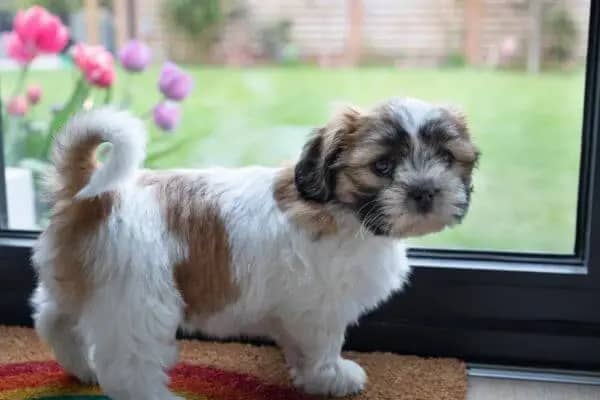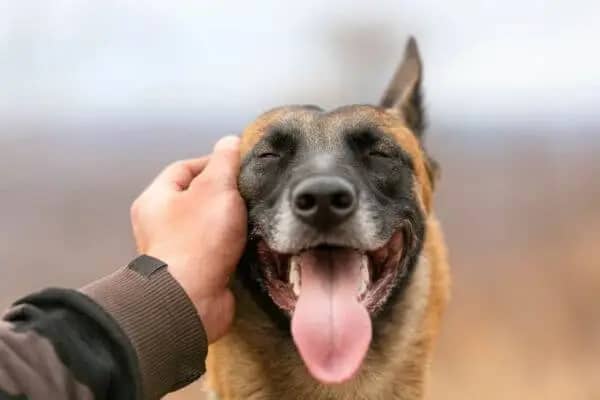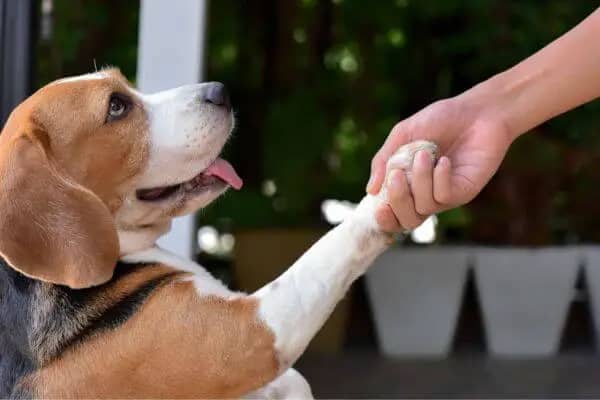It can be daunting to housetrain your new puppy, but it doesn’t have to be!
With the right approach and patience, you can teach your pup how to do his business outside in no time. This article will provide all of the tips and tricks for successfully housetraining your little furry friend so that he becomes an obedient family member.
1. Establish a Routine to Housetrain Your New Puppy
Creating a routine can help with the endeavor of housetrain your new puppy quickly and easily. To get started, consider what rewards you want to use with them. This could be verbal praise, a short game, treats they find particularly tasty, or a combination!
Also, you will have to choose a designated area for them to potty. This can be in a park outside (remember to pick up their feces), a part of the garden, or a good position in the house with artificial grass or without it.
When establishing a routine, it’s important to remember to stay consistent in both timing and place. Suppose you are teaching your dog to go outside. Take your puppy out every few hours during the day, including immediately after eating or drinking, so they can learn where it is acceptable to go potty. A good rule of thumb is taking them out first thing in the morning, last thing before bedtime, and whenever you notice signs of needing to eliminate them, such as sniffing around or circling an area.
If you catch them just starting (or worse yet, already finished!), interupt them, scoop them up and rush outside without scolding – this helps avoid confusion about why you are bringing them out since puppies don’t understand punishment very well.
If you want to teach your dog to excrete in a particular area of the house. When they do in incorrect places, clean it with newspaper or other absorbent paper whenever they pee and take it to the place you want your dog to make its mess. Also, clean thoroughly the area you don’t want your dog to piss or defecate with bleach. The aroma or lack of it will teach the dog where is the correct toilet.
The key to successfully housetraining your new puppy is providing positive reinforcement whenever your puppy eliminates outdoors or in the proper place. It may seem silly but give Plenty of verbal encouragement each time they do their business outside so they know exactly what behavior is expected from them! Additionally, ensure there are no distractions once you bring your pup into the yard – keep other pets away if possible and watch closely until they finish potty.
Finally, reward generously right after finishing by offering treats or playing a game with your pup; this way, they’ll associate eliminating outdoors with something fun!
2. Praising Positive Behavior is Key
Praising your new puppy for positive behavior is a great way to help with house training. Not only will it make the process smoother, but it will also reinforce good habits and create an environment where everyone involved can feel comfortable.
Here are four key points to keep in mind when using praise as part of the training program:
- Provide verbal commands while reinforcing desired behaviors, so your puppy knows what you expect from them.
- Use reward systems such as treats, praise or toys, encouraging them to continue exhibiting acceptable behavior.
- Speak calmly and positively when praising your pet; this helps maintain healthy relationships with those around you and allows the pup to associate pleasant rewards with listening to their owner’s instructions.
- Be consistent! This means rewarding all good behavior immediately, no matter how small – ensuring they learn quickly and accurately understand what is expected.
If mistakes happen, address these appropriately without being harsh on your furry friend – remember that puppies don’t yet have complete control of their bladder muscles!
With patience and consistency, though, following these steps should lead to success in housetraining your new pup before long!
3. Consistent Training = Successful Puppy House Training
Now that you understand how important it is to reinforce good behavior let’s discuss another equally important factor in housetraining your new puppy – consistency. It may seem like a no-brainer, but being consistent with how you train your pup will play a massive role in ensuring they learn what behaviors are expected of them and which ones aren’t.
Using rewards as part of this process can be highly effective. Rewarding your pup when they do something right encourages them to repeat the behavior over time and helps them understand that you appreciate their desired actions. Likewise, ignoring unwanted behavior will help ensure these don’ts become universal standards for them moving forward.
Crate training is also beneficial when trying to housetrain your pup. Not only does it give your pup a safe space to call their own (When used correctly!), but it can also provide some much-needed structure during potty breaks since dogs generally prefer not to soil where they sleep or rest. Some essential tips for crate training include:
- Start small
- Use treats
- Limit water intake before bedtime
- Give Plenty of praise
- Make sure there’s enough room
- Introduce gradually
Keeping all of these things in mind while you begin housetraining your puppy should set both of you up for success! Remember that patience pays off; if you make an effort each day, those habits will eventually become ingrained into a routine.
4. Understanding Your Dog’s Signals
Dogs are intelligent animals and can learn to understand your commands with the proper training. One of the first things you should do when housetraining your new puppy is to understand their signals. This will help you create a successful reward system for desired behaviors.
Your pup might communicate that they must go outside by barking, scratching at the door, or circling in excitement. If you notice these signs, take them out immediately so they can relieve themselves on appropriate surfaces such as grass or dirt rather than indoors.
When they finish going potty, praise them and give them treats as rewards for good behavior. Crate training is another important way to successfully train your dog while providing an area where they feel safe and secure when you cannot be with them.
Start slowly by introducing your pup to their crate and gradually working up to leaving it closed until they get used to being inside it without feeling anxious or stressed. Ensure the crate has Plenty of soft bedding and toys for comfort and access to food and water throughout the day if needed.
Housetrain your new puppy may seem daunting, but with patience and consistency, you can effectively teach your pup how to use the bathroom in the correct place. By creating a positive environment filled with affectionate reinforcement through verbal praise and treats every time they follow instructions correctly, your puppy will soon become an expertly housetrained pet.
5. How To Deal With Accidents
Accidents will happen when housetraining your new puppy, but it’s important to remember that they are just accidents. Recognizing triggers and using training aids is an essential part of teaching good habits and helping your pup adjust quickly in their new home.
The key to effective housetraining your new puppy lies in consistency and regularity; establish a routine from day one and stick with it as much as possible.
Training aids such as indoor dog pads or litter boxes can be helpful for housebreaking puppies, so don’t feel ashamed about using them if you think they could help.
Try setting up small areas around the house where you can confine your pup until he learns how to control his bladder on command.
If there’s ever an accident, make sure not to overreact; scolding or punishing your pet won’t do anything but create fear and anxiety instead of making them understand why they should avoid these behaviors again in the future.
By remaining patient and persistent while recognizing each success along the way, even the most stubborn pups can eventually learn proper housebreaking techniques.
As long as owners remain consistent and attentive during this period, any puppy can become well-mannered inside the home within no time!
Frequently Asked Questions
How Long Does It Take To Housetrain your new puppy?
Depending on the individual pup and your consistency, housetraining can take a few weeks to several months.
How Do I Know When My Puppy Needs To Go?
Puppies often sniff around or circle an area when they need to go, they might whine or go to the door; observe your pup’s behavior so you can anticipate when they want to relieve themselves.
Is It Okay To Use A Crate To Help With Housetraining?
When done properly, that is, when the dog feels comforatble in the crate, it can really help with housetrainin. Just remember not to leave to much time your puppy inside the crate
How Do I Prevent My Puppy From Having Accidents In The House?
Have patience and utilize positive reinforcement when your pup does their business outside and in the designated “potty spot.”
If you catch them mid-accident inside, don’t scold or punish them, interrupt them take them out immediately and provide lots of praise for going to the right place.
What Do I Do If My Puppy Has An Accident Indoors?
If your puppy has an accident indoors, don’t scold them – this will have a negative effect, and they won’t understand why. Instead, focus on positive behavior and reward them for good behavior with treats or praise.
Establishing a reward system is critical to successful house training; it teaches puppies that going outside results in rewards, encouraging them to do their business outdoors. Positive reinforcement should be used whenever possible, as puppies respond better to encouragement than criticism.
Conclusion
It can take a few weeks to several months for your puppy to be fully housetrained. Patience and consistency are essential when it comes to teaching them.
For example, I have had success with my pup by creating a schedule that works best for us both – taking him out frequently throughout the day and rewarding him with treats each time he goes in the right spot. This positive reinforcement helps keep him on track and lets him know what is expected of him. Housetraining may seem daunting at first, but if you stay consistent, eventually, you will reap all the rewards!
At Bone Voyage Dog Rescue, we understand the importance of responsible dog ownership and training, and that’s why we are dedicated to rescuing and finding loving homes for Mexican dogs. By adopting from our non-profit organization, you not only give a deserving dog a bright future but also contribute to our mission of minimizing the number of homeless dogs in the area of Mexico.
So, if you want to add a furry companion to your home, consider adopting from Bone Voyage Dog Rescue. Our dogs receive the best care from our loving volunteers, and we provide transportation services to ensure they make it to their new homes safely.
Don’t hesitate to contact us or check out our website to learn more about our rescue efforts and see the dogs available for adoption. Together, we can make a difference in the lives of these deserving animals.



